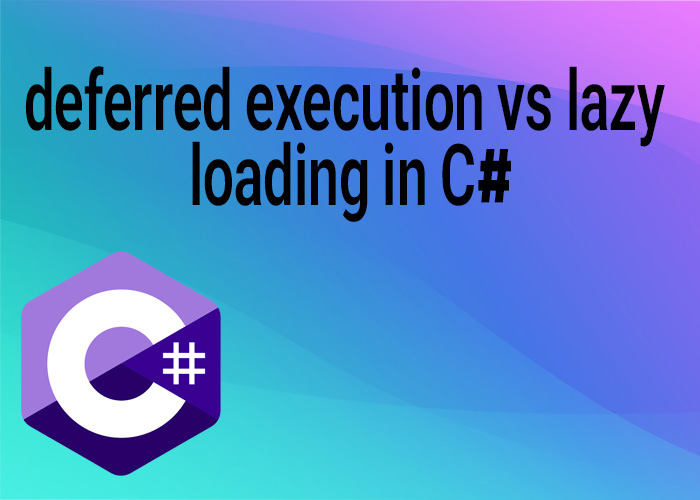Understanding Deferred Execution vs. Lazy Loading in C#
In the realm of C# programming, optimizing data processing and memory usage is crucial for developing efficient applications. Two important concepts that aid in such optimizations are deferred execution and lazy loading. Although they are often used to achieve similar performance enhancements, their applications and implications can differ significantly.
What is Deferred Execution?
Deferred execution refers to the postponement of query execution until the moment its results are actually needed. In C#, this is primarily seen with LINQ (Language Integrated Query) where queries are constructed in a way that they do not execute when they are defined but rather when the data is actually consumed.
Example of Deferred Execution:
var numbers = new List<int> { 1, 2, 3, 4, 5 };
var filteredNumbers = numbers.Where(n => n > 3); // Query defined
foreach (var num in filteredNumbers) // Query executed here
{
Console.WriteLine(num);
}
In this example, the LINQ query does not fetch or filter any numbers at the point of its definition. The actual query execution is deferred until the foreach loop iterates over the filteredNumbers, which triggers the query to run.
What is Lazy Loading?
Lazy loading, on the other hand, is a design pattern commonly used in object-relational mapping that delays the loading of an object or its properties until it is specifically required. This can help in reducing the startup time of applications by avoiding unnecessary computation or database queries.
Example of Lazy Loading:
Consider an application that interacts with a database containing employee and department data. In a lazy loading scenario, the details of the department an employee works in are not fetched from the database until an explicit request is made to access that particular property.
public class Employee
{
public int Id { get; set; }
public string Name { get; set; }
private Department _department;
public Department Department
{
get
{
if (_department == null)
{
_department = Database.LoadDepartment(this.DepartmentId);
}
return _department;
}
}
public int DepartmentId { get; set; }
}
In this code snippet, the Department property of an Employee object is loaded lazily. The department data is only retrieved when the Department property is accessed for the first time.
Key Differences
- Application Scope: Deferred execution is typically used in the context of data querying scenarios, particularly with LINQ in C#, whereas lazy loading is a broader design pattern used in various programming contexts, including but not limited to database interactions.
- Trigger: Deferred execution is triggered by iterating over a query result, whereas lazy loading is triggered by accessing a specific property or object.
- Purpose: While both techniques aim to optimize performance by delaying operations, deferred execution is query-specific, and lazy loading is object-specific.
Conclusion
Both deferred execution and lazy loading are essential for writing performant C# applications, especially when dealing with large datasets or resource-intensive operations. Understanding when and how to use each can greatly enhance your application's responsiveness and efficiency. By integrating these concepts thoughtfully, developers can ensure that resources are used optimally, enhancing the overall user experience.





